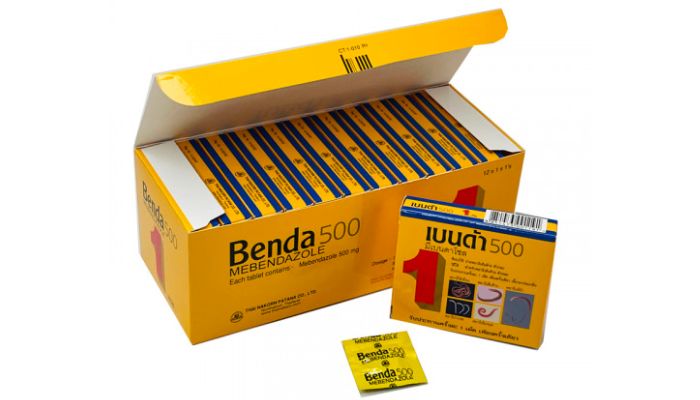Mebendazole
Mebendazole Dosage
Mebendazole is a crucial medication used to treat intestinal worm infections. This first part of our in-depth guide will focus on the appropriate dosages of mebendazole, considering various factors such as the type of infection, patient age, and potential drug interactions.
Understanding Mebendazole Dosage
Mebendazole is effective against common worm infections, including pinworms, roundworms, and hookworms. The dosage varies based on the type of infection and the patient’s age.
Dosage for Adults and Children
For most worm infections, mebendazole is given as a single oral dose of 100 mg. In cases of mixed infections or severe infections, a second course of treatment might be necessary. For children, the dosage is often calculated based on body weight (mg/kg). It’s crucial to follow the healthcare professional’s prescription to ensure effectiveness.
100 mg Chewable Tablets
Mebendazole is commonly available in 100 mg chewable tablets, making it easier for children to ingest. Adults can also use these tablets, especially those who have difficulty swallowing pills.
Treating Gastrointestinal Infections
For gastrointestinal infections caused by worms, mebendazole effectively eliminates the parasites by hindering their glucose uptake, which is essential for their survival. The standard dose for these infections is usually 100 mg, taken twice a day for a prolonged duration, as prescribed by the doctor.
Considerations for Special Populations
Pregnant Women
The use of mebendazole in pregnant women should be approached with caution. While there are no adequate studies in humans, animal models, such as pregnant rats, have shown adverse outcomes at high doses. It’s essential to consult a healthcare professional and consider the potential risks before starting treatment.
Breastfeeding
Mebendazole’s presence in human milk is not well-documented. Nursing mothers should discuss with their healthcare professional the risks and benefits of using this medication while breastfeeding.
Managing Missed Doses
If a dose is missed, it should be taken as soon as remembered. However, if it’s almost time for the next dose, skip the missed dose and continue with the regular schedule. Do not take more than one dose at a time to make up for a missed dose.
Drug Interactions and Adverse Effects
Mebendazole can interact with other drugs, leading to possible drug interactions that may affect the efficacy of the treatment or increase the risk of adverse effects. Patients should inform their healthcare professional about all medications they are taking.
Common Adverse Reactions
While mebendazole is generally well-tolerated, some patients may experience adverse reactions such as stomach pain, diarrhea, and skin reactions. In rare cases, serious skin reactions or severe abdominal pain may occur, necessitating immediate medical attention.
Instructions for Use and Treating Specific Worm Infections with Mebendazole
Oral Administration
Mebendazole is administered orally and is available in tablet form. The tablets are designed to be either chewed or crushed before being taken. This is particularly important as it ensures the medication is properly activated and ready for absorption in the digestive tract.
For Adults and Older Children: The tablets should be chewed thoroughly or crushed and then swallowed with a glass of water. It’s important to ensure the entire tablet is consumed to receive the full dosage.
For Young Children and Those with Swallowing Difficulties: If chewing or swallowing whole tablets is challenging, mebendazole can be made more palatable. Crush the tablet and mix it with a small amount of water to create a soft, semi-solid consistency. This mixture should be immediately swallowed to ensure the correct dosage is administered.
Treating Specific Worm Infections
The effectiveness of mebendazole can vary based on the type of worm infection being treated. It’s crucial to follow the prescribed dosage for each specific infection to ensure effective treatment.
Pinworms and Roundworms
These are common worm infections treated with mebendazole. A single oral dose of 100 mg is usually effective. However, in cases of severe or persistent infections, a healthcare professional may recommend a second course of treatment. This typically involves taking another 100 mg dose two weeks after the first dose to ensure all worms, including any newly hatched ones, are eliminated.
Hookworms and Whipworms
These infections can be more stubborn and may require a slightly higher dosage for effective treatment. The usual prescription is 100 mg of mebendazole, taken twice a day for three consecutive days. This increased dosage and extended treatment period help ensure that all stages of the worms are targeted and eliminated.
Mixed Infections
When dealing with mixed infections, where more than one type of worm is present, the dosage of mebendazole may need to be adjusted to effectively target all the different worms. In such cases, the standard treatment is often a 100 mg dose, taken twice daily. The duration of this treatment can vary depending on the severity and types of worms involved but typically lasts for a few days.
Important Considerations
Follow-Up and Reinfection Prevention: After completing a course of mebendazole, it’s important to maintain good hygiene practices to prevent reinfection. This includes regular hand washing, especially after using the bathroom and before meals.
Monitoring for Efficacy and Side Effects: While undergoing treatment, if symptoms persist or worsen, or if new symptoms develop, it’s important to consult a healthcare professional. They may need to adjust the treatment plan or check for possible side effects.
Diet and Lifestyle: While mebendazole is effective on its own, its efficacy can be supported by a balanced diet and healthy lifestyle. This helps strengthen the body’s natural defense mechanisms against infections.Importance of Medical and Lab Appointments
Regular medical and lab appointments are essential to monitor the effectiveness of the treatment and to check for any adverse reactions. These appointments also allow healthcare professionals to adjust the dosage if necessary.
Monitoring for Adverse Effects
Adverse effects, though rare, can occur. Regular monitoring helps in early detection and management of any adverse reactions, including serious skin reactions or gastrointestinal issues.
Expanded Information on Drug Interactions with Mebendazole
Mebendazole, like many medications, has the potential to interact with other drugs, which can impact its effectiveness or increase the likelihood of adverse effects. Understanding these interactions is crucial for anyone undergoing treatment with mebendazole. Here’s a more detailed look at how mebendazole interacts with other substances:
Types of Potential Drug Interactions
- Interactions Affecting Mebendazole’s Efficacy:
- Certain medications may either increase or decrease the absorption or metabolism of mebendazole in the body. For instance, drugs that alter the acidity of the stomach could affect how well mebendazole is absorbed.
- Some drugs might speed up the metabolism of mebendazole, reducing its effectiveness by decreasing its concentration in the body.
- Mebendazole Affecting Other Drugs:
- Mebendazole can also impact the effectiveness of other medications. For example, it might interfere with the metabolism of other drugs, leading to either an increase or decrease in their levels in the blood.
- Increased Risk of Adverse Effects:
- When combined with certain medications, mebendazole might increase the risk of side effects. This is particularly true if the other medication has similar side effects or if both drugs are metabolized by the liver, potentially leading to liver toxicity.
Common Interactions to Be Aware Of
- Anticonvulsants: Medications used for seizures, like phenytoin or carbamazepine, can affect how mebendazole is metabolized.
- Anticoagulants: If you are taking blood thinners, such as warfarin, mebendazole might affect their efficacy, necessitating closer monitoring of blood clotting times.
- Cancer Chemotherapy: Mebendazole can interact with certain chemotherapy drugs, potentially leading to increased toxicity or reduced effectiveness of cancer treatment.
- Metronidazole: There is a reported risk of Stevens-Johnson syndrome/toxic epidermal necrolysis when mebendazole is taken in combination with metronidazole.
Over-the-Counter Drugs and Supplements
- Herbal Supplements: Certain herbal products may interact with mebendazole, affecting its absorption or metabolism.
- Vitamins and Minerals: High doses of some vitamins and minerals might interact with mebendazole, especially if they affect liver function or gastrointestinal health.
Importance of Healthcare Professional Consultation
- Full Disclosure of Medications: It’s vital to inform your healthcare provider about all the medications you are taking, including over-the-counter drugs, prescription medications, and dietary or herbal supplements.
- Regular Monitoring: If you are on multiple medications, regular monitoring may be necessary to check for drug interactions and adjust dosages accordingly.
- Personalized Advice: Since each individual’s health situation is unique, the potential for drug interactions with mebendazole can vary. A healthcare professional can provide personalized advice based on your medical history and current medication regimen.
Managing Drug Interactions
- Adjusting Dosages: In some cases, adjusting the dose of mebendazole or the interacting drug can mitigate the risk of interactions.
- Alternative Medications: If a significant interaction is identified, your healthcare provider might recommend an alternative medication to either mebendazole or the interacting drug.
- Close Monitoring for Side Effects: Especially in cases where interaction is unavoidable, close monitoring for any adverse effects is crucial.
Mebendazole in Public Health
Mebendazole plays a significant role in public health, particularly in regions where worm infections are endemic. These infections, if untreated, can lead to serious health issues, including malnutrition, anemia, and impaired cognitive development, especially in children.
Mass Drug Administration (MDA)
In many countries, mebendazole is used in mass drug administration programs to control soil-transmitted helminth infections. These programs involve providing the medication to large populations, particularly school-aged children, to reduce the prevalence of worm infections.
Impact on Community Health
By reducing the burden of worm infections, mebendazole contributes to improved overall community health. Healthier individuals can lead to increased productivity and economic benefits for communities. Additionally, reducing worm infections can decrease the burden on healthcare systems.
Global Health Initiatives
Mebendazole is a key component in global health initiatives aimed at controlling and eliminating neglected tropical diseases (NTDs). Organizations like the World Health Organization (WHO) and various non-governmental organizations (NGOs) work together to distribute mebendazole in affected regions.
Future Directions
Research and Development
Continued research is essential to improve the efficacy and safety of mebendazole. This includes developing formulations that are more effective against resistant worm strains and better suited for different populations, such as young children or pregnant women.
Monitoring Drug Resistance
As with any medication, there is a risk of developing resistance. Ongoing monitoring and research are necessary to detect and manage any emerging resistance to mebendazole.
Integrating with Other Health Measures
Mebendazole’s effectiveness can be enhanced when integrated with other health measures. This includes improving sanitation, access to clean drinking water, and education on hygiene practices. Such integrated approaches are crucial for sustainable control of worm infections.
The Role of Healthcare Professionals
Healthcare professionals, including doctors, nurses, and pharmacists, play a vital role in the safe and effective use of mebendazole. They are responsible for prescribing the correct doses, monitoring for side effects, and providing education on the importance of completing the treatment course.
Educating Patients
Educating patients about the importance of adhering to the treatment regimen, possible side effects, and when to seek medical attention is crucial. This education can improve treatment outcomes and reduce the risk of drug resistance.
Conclusion
Mebendazole is a cornerstone drug in the treatment of worm infections, with significant implications for individual and public health. Its role in global health initiatives and MDA programs has been pivotal in reducing the burden of these infections. Looking forward, continued research, monitoring for drug resistance, and integrated health approaches will be key in sustaining the gains made in controlling worm infections. As we advance, the role of healthcare professionals and public health policies will remain central in ensuring the safe, effective, and equitable use of mebendazole in the fight against these neglected diseases.


